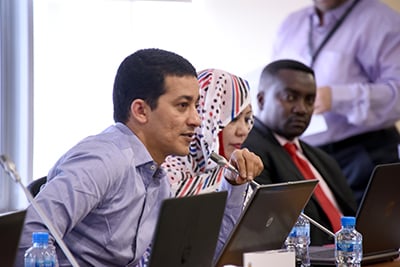What We Do
The IMF serves as a global hub for knowledge on economic and financial issues. Over the last seven decades, it has developed world-leading expertise and a repository of experience on what policies work, why they unleash growth and how best to implement them.
Informed by its experience gained across diverse countries at varying stages of their development, the IMF shares this knowledge with member countries through hands-on advice, training and peer-to-peer learning. This in turn helps governments modernize their economic policies and institutions.
The IMF’s capacity development work is part of its core mandate — along with tracking global economic developments and lending to countries that experience balance of payment crises. This knowledge sharing work focuses on the following areas:

Advise governments on how to raise revenues and effectively manage expenditure, including tax and customs policies, budget formulation, domestic and foreign debt, and social safety nets. This enables governments to provide better public services such as schools, roads and hospitals.
For instance: Liberia reached out to the IMF to help establish a modern tax structure to raise revenues and finance essential public services. The IMF helped strengthen Liberia’s audit and taxpayer services, and supported the establishment of the Liberia Revenue Authority to better endure the Ebola crisis in 2014.
The IMF’s areas of expertise in fiscal management include:
- Tax policy
- Tax and customs administration
- Expenditure policy
- Budget formulation
- Public financial management
- Fiscal policy and institutional frameworks
Learn More
- FAD Capacity Development brochure
- Revenue Mobilization Fund
- IMF Revenue Portal
- Managing Natural Resource Wealth Fund
- Tax Administration Diagnostic Assessment Tool (TADAT)
- IMF’s Public Financial Management Blog
- Public Investment Management
- Revenue Administration Fiscal Information Tool
- Fiscal Analysis of Resource Industries
- Fiscal Transparency Evaluations

Work with central banks to modernize their financial systems — such as exchange rate, inflation and debt policy — and their banking supervision. This improves the country’s financial stability, fueling domestic growth and international trade.
For instance: The IMF assisted the Palestine Monetary Authority in building an automated, online credit registry system that allows financial institutions to monitor credit more effectively. Considered among the best in the region, this helped smaller companies and individuals gain access to credit and reduced non-performing loans.
The IMF’s areas of expertise in monetary policy include:
- Monetary and exchange rate policy
- Central bank operations
- Central bank governance and accounting
- Financial supervision and regulation
- Systemic risk analysis
- Financial crisis management
- Debt management
Learn More
Help countries align their legal and governance frameworks to international standards so they can develop sound financial reforms, fight corruption and combat money laundering and terrorism financing.
For instance: The IMF helped Sudan strengthen its legal and institutional framework to facilitate its integration into the global financial system. This enabled the Financial Action Task Force (FATF), in October 2015, to take note of Sudan’s significant progress and remove the country from its “gray list” of monitoring under global AML/CFT compliance process.
The IMF’s areas of expertise in the development of legal frameworks include:
- Financial institutions and market infrastructures
- Central banking and macro prudential oversight
- Tax law, fiscal law, and exchange systems
- Insolvency and creditor rights
- Anti-money-laundering/combating the financing of terrorism
Learn More

Help countries with compilation, management and reporting of their macroeconomic and financial statistics data. This provides more accurate understanding of their economy — including of economic vulnerabilities and risks — and helps formulate more informed policies. It also sends a message of transparency and fosters trust in government policies, thereby attracting international investors who use such statistics to gauge macroeconomic stability.
For instance: Adopting a regional, peer-learning approach, the IMF worked with 12 countries across Africa to compile and report on their Financial Soundness Indicators (FSI). Reliable data ensured countries became aware of their economic vulnerabilities, and sent a message of transparency, fostering trust in government policies.
The IMF’s areas of expertise in statistics include:
- Multisector statistical issues
- National accounts and price statistics
- Government finance statistics
- Balance of payments, external debt, foreign direct investment, and international investment position
- Monetary and financial statistics and financial soundness indicators
- Data dissemination standards
Learn More

Train government officials so they improve their ability to analyze economic developments; develop diagnostic, forecasting and modeling tools; and formulate and implement sound macroeconomic and financial policies. This helps deepen the dialogue with countries on policy and programmatic issues and facilitates sharing of policy experiences through peer-to-peer learning.
For instance: The Financial Programming and Policies (FPP) course covers the principal features of the main macroeconomic sectors of the economy and the linkages between them, and teaches participants how to diagnose macroeconomic imbalances and design adjustment policies. Since the online launch of the FPP course in 2013, more than 3,100 government officials have completed the training in English, French, Russian and Spanish.
In 2017, the IMF revamped its external curriculum to better integrate with member needs and the IMF’s core work. The new program is linked to well-defined learning objectives and hands-on policy analysis, and provides greater emphasis on lessons learned from global crises and economic developments (e.g. linkages and spillovers, global imbalances, and policy coordination).
Macroeconomic frameworks training provided by the IMF includes courses in the following areas:
- Financial Sector Policies
- Fiscal Policy
- General Macroeconomic Analysis
- Monetary, Exchange Rate and Capital Accounts Policies
- Special Topics (Inclusive Growth, Vulnerability Diagnostics, etc.)
- Macroeconomic Statistics
- Safeguard Assessments
- Specialized Fiscal Courses
- Legal Issues
- Country-specific Customized Trainings
Online courses are also being made freely available to the general public through massive open online courses (MOOCs) in partnership with edX.
Learn More
Brochure: “Forecasts int Action: Building Capacity in Macroeconomic Policy Analysis”


